Split-Barcelona-Split COVID-19 Trip Report, February 11 to 16, 2021
February 17, 2021 - It's been 3 and a half months since I last braved pandemic travel from Croatia to Spain. So, what's changed? My Split-Barcelona-Split COVID-19 trip report, from February 11 to 16, 2021.
At the end of October 2020, I traveled for the first time since the COVID-19 pandemic ravaged Europe. At the time, European countries were still figuring out how to introduce negative PCR tests for entry and defining what entailed being 'high-risk.' This time around, a year deep into the pandemic, it's safe to say most countries have defined requirements that work for them. Furthermore, the information is readily available for travelers online to avoid any mishaps on their journey, which I nearly avoided (more on that later).
Not quite for tourism purposes, I booked my trip to Barcelona to visit my partner who currently plays water polo there. His birthday falls on February 13, conveniently before Valentine's Day, and fortunately, on a weekend when he didn't have any games. Much like my first trip visiting him there, I needed to bring a suitcase of his belongings, which had been sitting in my bedroom since COVID-19 forced him out of Split last March.
Unfortunately, it wasn't much easier getting to Barcelona this time - and thanks to the double whammy of it being the offseason in the middle of a pandemic, not only were ticket prices steep, but the usual two-hour travel time turned into 14-hour travel days from start to finish.
The only available options were on the route from Split-Zagreb-Frankfurt-Barcelona and back, operated by Croatia Airlines and Lufthansa. At least my luggage was included in the ticket price.
I was tested for COVID-19 24-hours before my departure at the Vukovarska testing center in Split. A huge win is that testing prices were halved at the end of January, so instead of paying almost 900 kn for a PCR test and English translation, tests are currently 400 kn and 450 kn with a translation. I was tested at 7:40 am and received my result via email before 5 pm the same day, in English, and with my passport number included (another requirement for Spain).
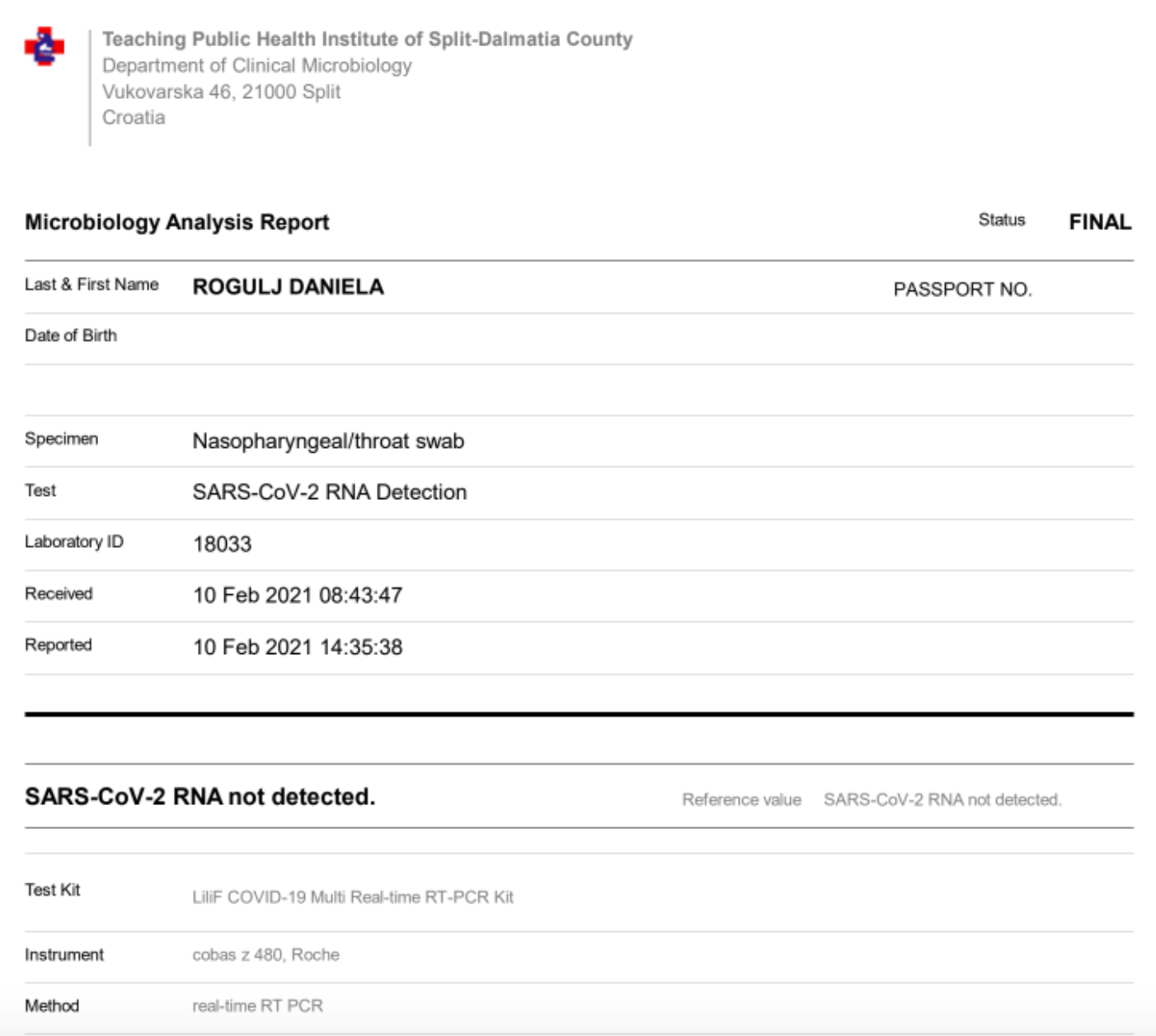
My 6:50 am flight time to Zagreb had me awake at 4 am to make sure I had everything in order. Arriving at the airport with just over an hour to spare, the woman at the check-in counter ensured I had a negative COVID-19 test in hand and confirmed that I had completed the health registration form for Spain as I'd need the QR code to enter the country. I did.
"You're my favorite kind of traveler."
As you can imagine, Split Aiport doesn't have much going on before 6 am, especially during corona times, so I was through security and at my gate with plenty of time to spare. My flight to Zagreb was nearly full.
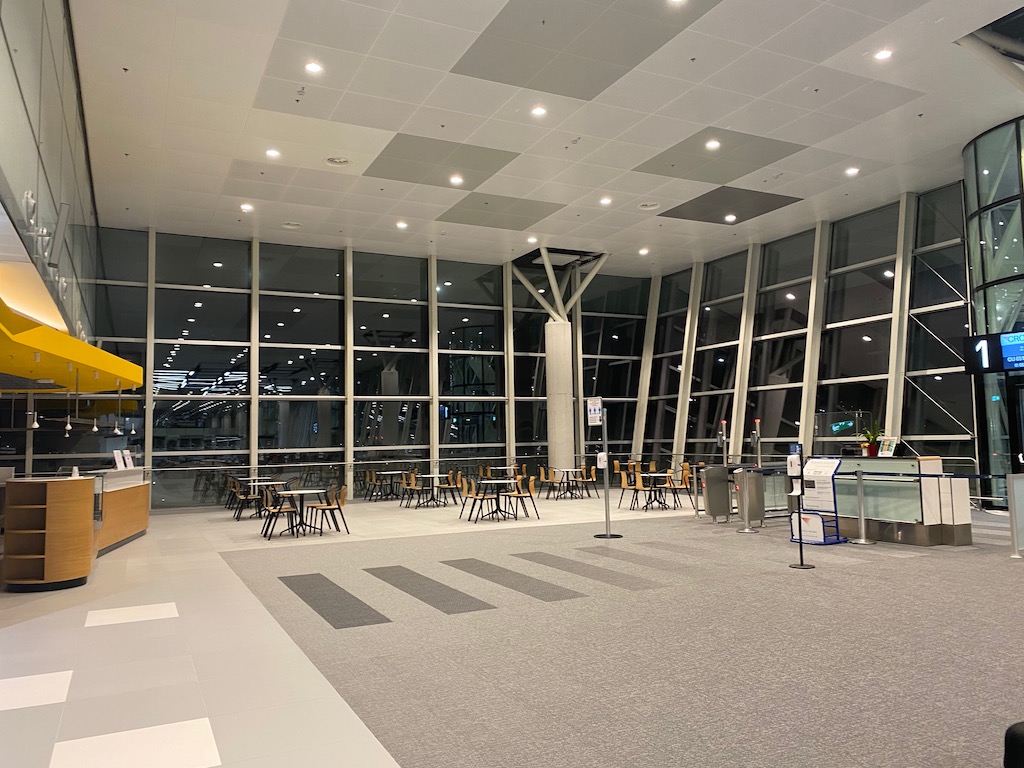
My quick connection in Zagreb had me there long enough to examine that Costa coffee was open for to-go drinks and pastries, and Duty-Free welcomed a few shoppers. Other than that, there is not much to do but stare and each other's masks while waiting to board.
Observation: Unlike when I traveled in October, the airport staff was not concerned with the type of mask passengers wore. Last time, we were only allowed disposable surgical masks, which were checked and distributed if needed before boarding. This time, cloth, filter, and disposable masks were accepted.
Croatia Airlines shared disinfectant wipes to all passengers once they boarded the flight.
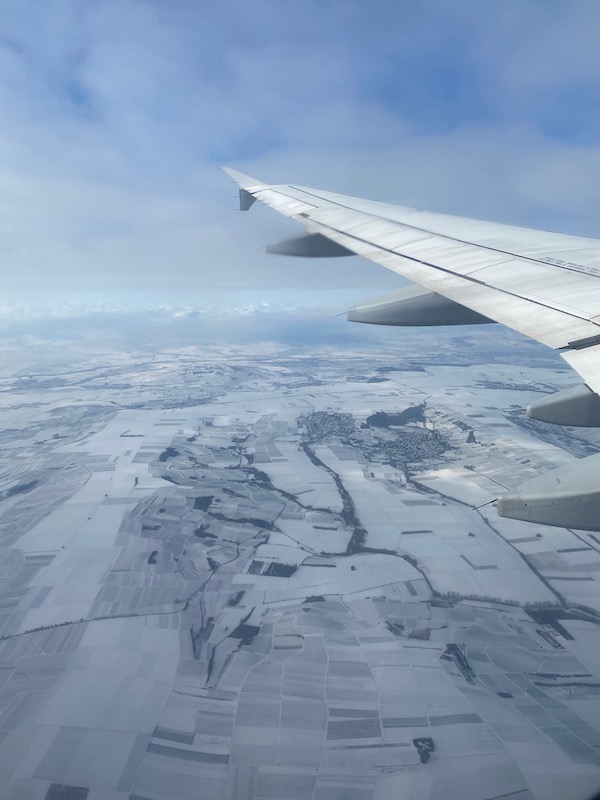
My arrival in Frankfurt was smooth, and a quick trip through security brought me to my gate two hours before my departure to Spain. Frankfurt airport was busy with travelers, but only cafes, hot dog stands, and small convenience shops worked.
All that was needed when boarding for Spain was my ticket and passport - no QR code or test result was checked then, though they did announce on the intercom before boarding that both documents were required. My flight was full.
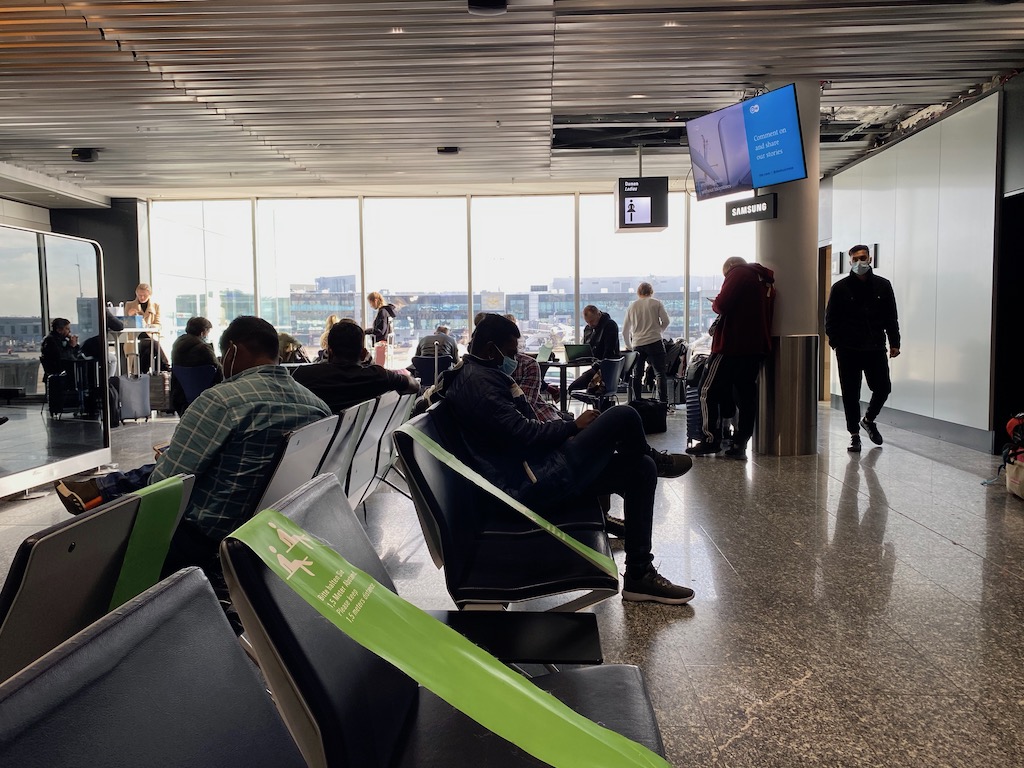
Spain changed their entry requirements in November 2020, two weeks after I visited last time.
"Spanish authorities require all passengers traveling to Spain to complete the FCS health control form (exceptions are passengers in transit). The generated QR code must be presented upon arrival. All travelers to Spain over 6 years of age must have a medical certificate with a negative COVID-19 RT-PCR or TMA test result. The test must have been taken at most 72 hours before arrival, and the certificate must be in English, German, French, or Spanish. Spanish authorities may impose fines up to EUR 6000 per person to passengers who do not comply with entry regulations," Lufthansa alerted me before my flight.
We arrived in Spain and headed to baggage claim, though not before we entered an area marked for health checks, with airport officials showing passengers to one of two lines. I was ushered into the line where my entry QR code was scanned (and no COVID-19 test checked), while the other line had various health officials checking test results and QR codes. I arrived at baggage claim 30 seconds later and received an email from Spanish health officials welcoming me to Spain.
Another thing that was different in Spain this time is that restaurants and bars are open for indoor and outdoor dining, albeit during two-time blocks - in the morning for breakfast from 7:30 am to 10:30 am and for lunch from 1 pm to 4:30 pm. While there is still a curfew between 10 pm and 6 am, delivery works until 11 pm. Barcelona closed indoor and outdoor dining a week before I arrived in October.

This was a game-changer, given that bars and restaurants have been closed for indoor and outdoor dining in Croatia since November.
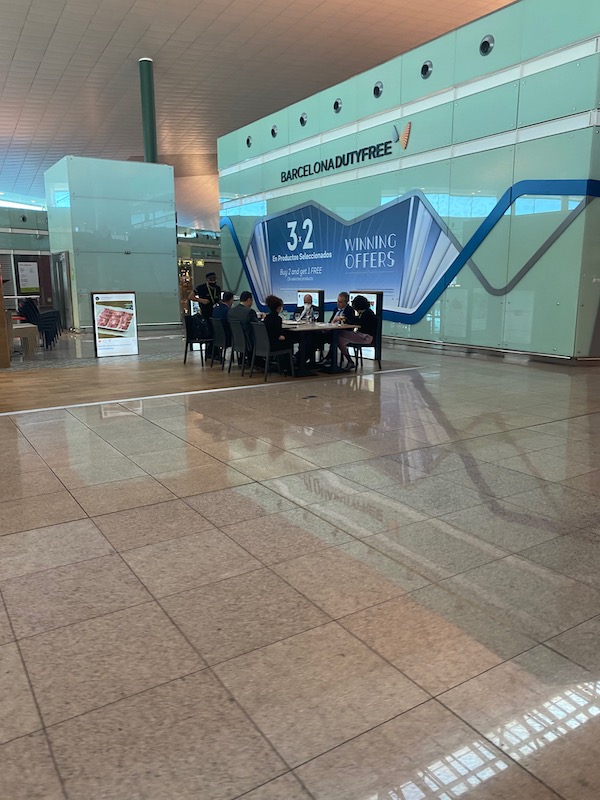
Like my last trip to Barcelona, masks are mandatory inside and outside, and it's rare to find anyone not following the rules. Shoppers sanitize their hands upon entering any store, and the discipline of the citizens does not go unnoticed.
Twenty-four hours before my flight back to Croatia, I took a PCR test at a local clinic that promised same-day results. The price was not as friendly as in Croatia (85 euro), but I wanted to ensure I was healthy returning home, especially since I would be in contact with my high-risk mother who babysat my cats while I was away.
Recall, if you do not show a negative PCR test, no older than 48 hours, upon arrival in Croatia, you are subject to self-isolation until you can show a negative PCR test, which is done at your expense. More on that here.
The testing experience in Spain was also a bit... aggressive. The nurse swabbed deep into each nostril for 10 seconds and continued to all corners of my mouth and gums, unlike the far more delicate experiences I've had in Croatia. I received my negative test result the same day, around 6 pm.
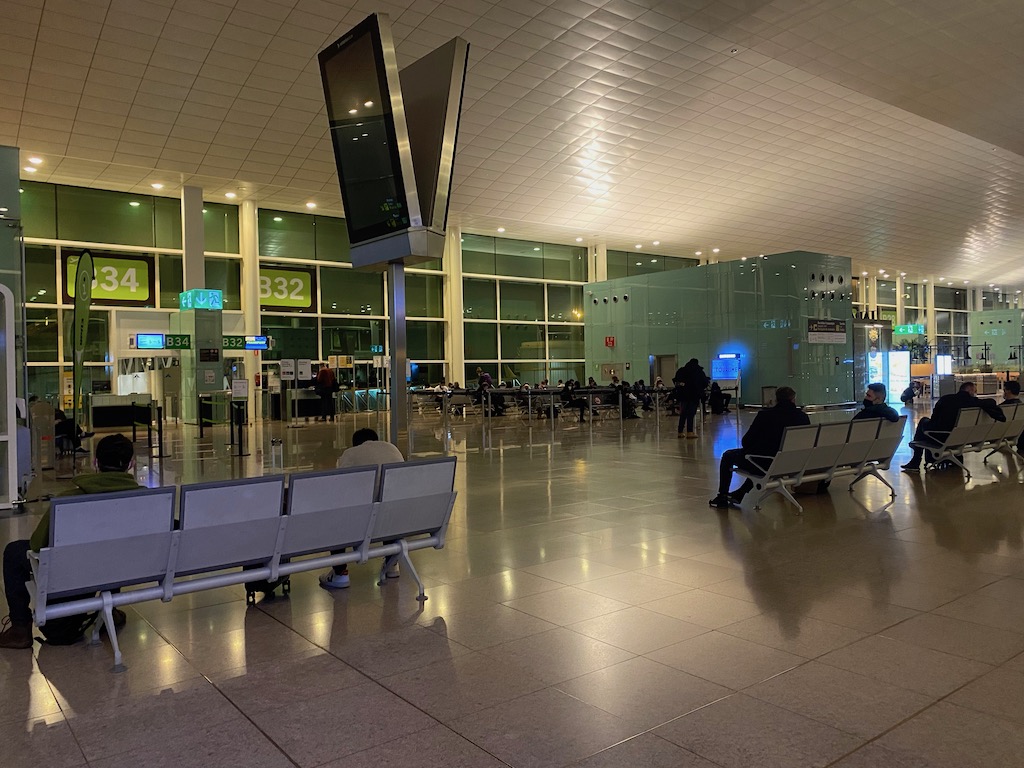
After a full four days in the Catalonian capital, it was time to return home on yet another 6 am flight and 3:30 am wake-up call. The agent at the check-in counter asked to see my negative test before checking my bag and continuing to security. My flight to Frankfurt was half full, and there was no one sitting between me and my row-mate.
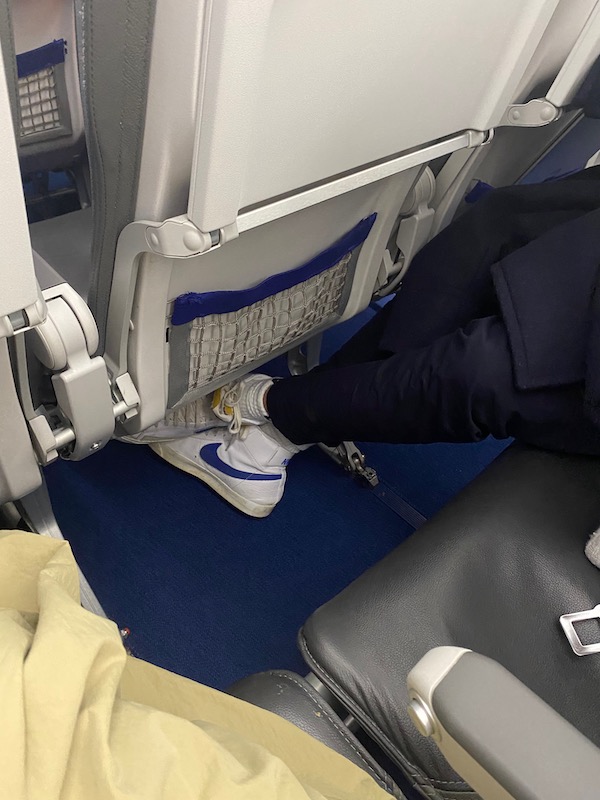
Once we disembarked the plane in Frankfurt, German police greeted us to check that passengers staying in Germany had the correct documentation. Since I was on my way to Split, they sent me along.
With a few hours to spare before my flight to Zagreb, I felt a sense of relief as I was halfway home. I went to the gate only to find passengers boarding to Seattle before us - I don't think there were more than 20 passengers on that plane.

Boarding for Zagreb was slower than normal as the buses that transported passengers from the gate to the plane arrived 20 minutes apart. There was not a free seat on the always-fun propellor plane journey to Zagreb. We were asked to fill out health forms during the flight, which the flight attendants collected and turned into the authorities once we arrived.
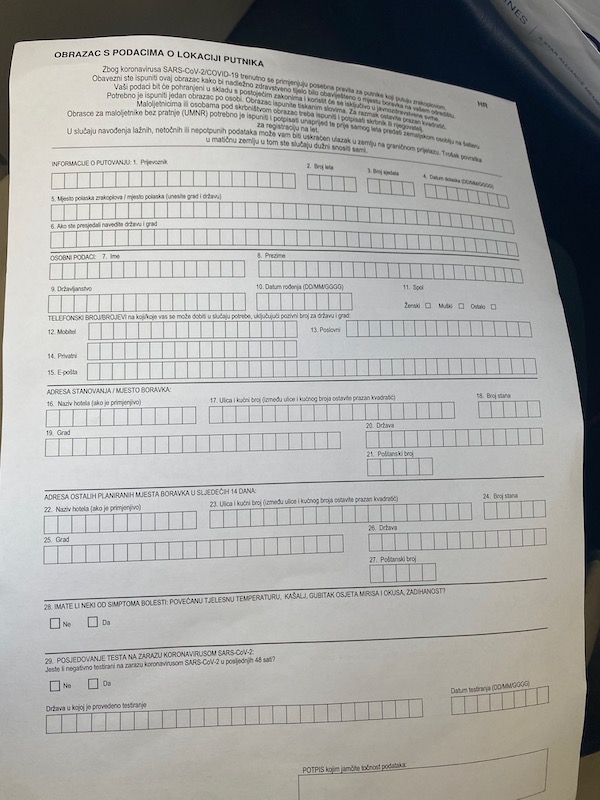
Despite leaving 10 minutes later than scheduled, we arrived in Zagreb on time, or at 1:35 pm, with just enough time for my flight to Split, departing at 2:35 pm. While this would almost always be more than enough time to connect for a domestic transfer at Zagreb Airport, especially during pandemic times, Zagreb managed the unthinkable.
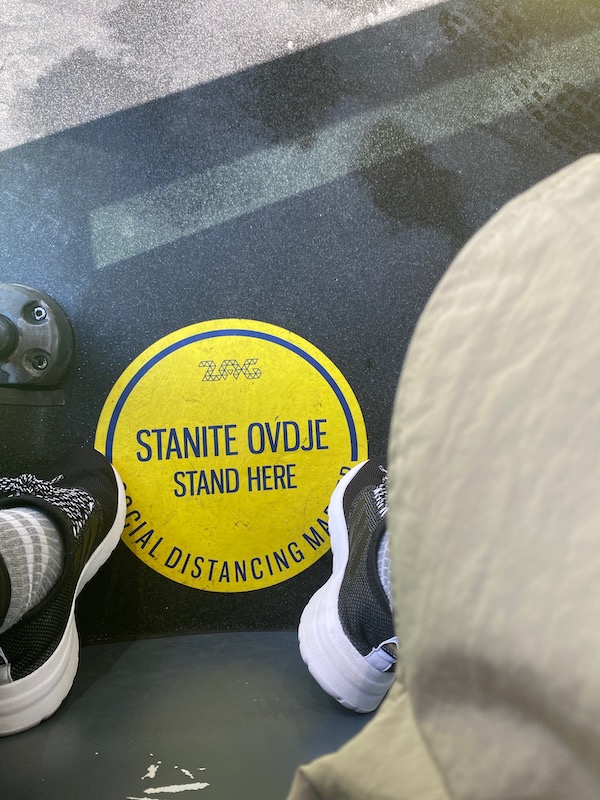
Around 25 people from my Frankfurt flight continued onto a domestic transfer, which resulted in a larger line at passport control - but only in extraordinary circumstances could this affect me making my flight, I thought.
However, only one passport control officer was on duty, spending on average 3-5 minutes with each passenger who:
1.) Didn't know they needed a negative PCR test to enter Croatia and tried avoiding mandatory self-isolation for various reasons, which resulted in phone calls, and even the arrival of a new officer, who didn't think to jump in and help check tests or documents
3.) Had the wrong type of test and complained that they didn't know they needed a PCR test to enter Croatia
4.) Had a negative PCR test to enter, which the officer required you send to his email right then and there.
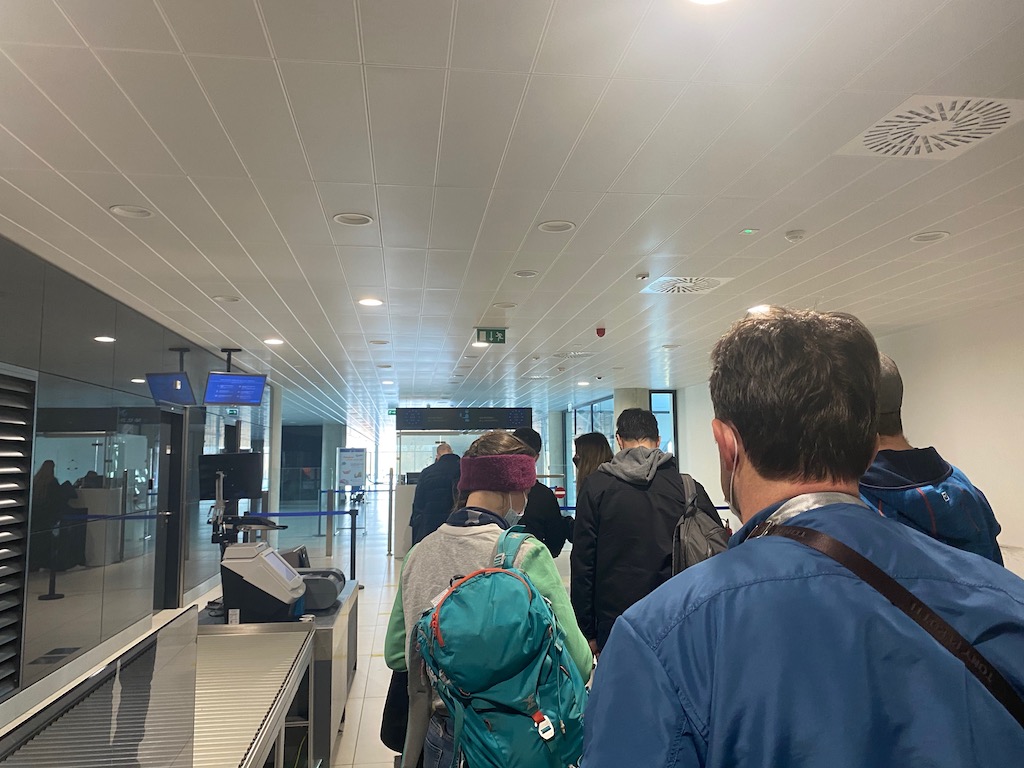
Boarding for my flight was at 2:15 pm, and around 2:00 pm, with another 15 or so still in front of me, I began to worry. Unsurprisingly, there was no one there to speak to apart from the lone worker at passport control.
At 14:18, they called final boarding for Split. I panicked, as did the 7 or so passengers behind me who were also connecting to Split. I asked the man in front of me who was traveling to Dubrovnik if I could sneak in front. I approached the counter and informed the officer they called final boarding for Split and had all of my documents and test ready to go.
He could not have cared less - nor did he hurry in the least.
He looked at my test, told me to send him an email of it, took my phone to enter the email address, and asked for my phone number. After 3 minutes, it was over, I rushed to my gate and informed them there were still others waiting at passport control, unsure of how long it would take. I finally boarded the plane, though the remaining passengers took another 15 minutes to arrive. All because of one officer at passport control.
We arrived in Split safe, sound, and somehow on time, with our bags arriving shortly after.
It was smooth sailing, that is until we arrived back in Croatia. While PCR tests no later than 48 hours old are required to avoid going into self-isolation, Zagreb Airport may want to consider adding a second officer in the passport area when flights land - or you may want to re-think the timing of your domestic transfer.
For the latest travel info, bookmark our main travel info article, which is updated daily.
Read the Croatian Travel Update in your language - now available in 24 languages.


